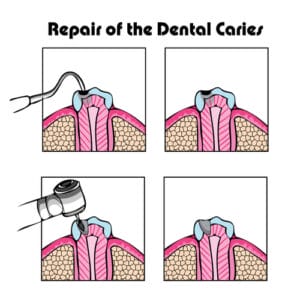 At Laser Dentistry of North Jersey in New Jersey, cavity prevention and treatment is handled with care to restore the beauty and health of patients’ teeth. For patients to understand the importance of proper dental care and dental visits in preventing cavities, they must understand how cavities are formed.
At Laser Dentistry of North Jersey in New Jersey, cavity prevention and treatment is handled with care to restore the beauty and health of patients’ teeth. For patients to understand the importance of proper dental care and dental visits in preventing cavities, they must understand how cavities are formed.
What Is a Cavity?
A cavity is a hole in a tooth where plaque bacteria has accumulated and caused part of the tooth to decay. The acid that is produced by the bacteria penetrates through the enamel of the tooth to the inner dentin. Left untreated, cavities will continue to grow and can cause the weakening and total destruction of a tooth.
How Does a Cavity Form?
A cavity forms because accumulated plaque attracts bacteria, which produce acid. The acid naturally eats away at the tooth structure, starting with the tooth enamel and then the dentin. The acid breaks down the structure of the tooth, which becomes weakened. A cavity may penetrate through the enamel and dentin layers of the tooth to the nerves within the root canal. When the root canal is infected, it can eventually cause the tooth to fall out or require extraction.
The acid produced naturally by plaque bacteria is a natural waste product that occurs when bacteria ingest fermentable carbohydrates, or sugars. Bacteria thrive on these sugars, which are present within patients’ mouths after they eat food.
Plaque bacteria will accumulate where fermentable carbohydrates accumulate, as it is their natural source for food. Plaque bacteria themselves are microscopic, but may begin to look yellowed or otherwise discolored when enough accumulate in one area.
The active ingredients and physical friction applied during brushing, flossing, and rinsing eliminate plaque bacteria. However, if a patient neglects a strict dental hygiene regimen or cannot clean all of each tooth, the bacteria will accumulate. Patients with weakened enamel may be more at risk to cavities as plaque bacteria can more easily penetrate through enamel to the inner dentin.
Patients can greatly reduce their risk for cavities by reducing the accumulation of plaque bacteria, by brushing, flossing, and rinsing, and by ingesting fewer sugary and starchy foods that feed the bacteria.
Detecting Cavities Early
At Dr. Richard Bucher’s New Jersey laser dentistry practice, he utilizes laser technology for a variety of diagnoses and treatment procedures, including cavity detection. The DIAGNOdent® laser light is able to detect tooth decay in hard-to-see parts of the mouth during early stages of a cavity.
If caught early, a cavity can be treated using a filling or other sealant, which will prevent the spread of the cavity and preserve the majority of the natural tooth. Regular dental hygienic practices and visits to Dr. Bucher’s New Jersey laser dentistry practice will greatly reduce the likelihood that a patient will suffer a severe cavity.
For more information on how cavities formed and are treated, please contact Dr. Bucher’s practice today for a confidential consultation. For patients in New Jersey, dental crowns, porcelain veneers, and a variety of other restorative and cosmetic dentistry procedures are offered at Dr. Bucker’s practice.





